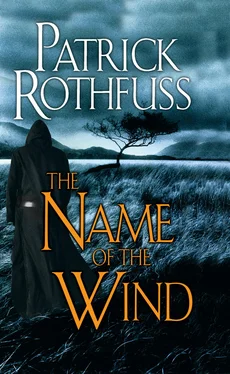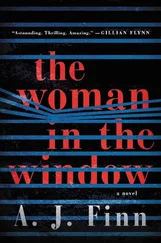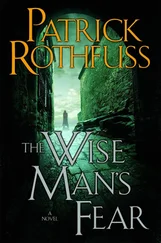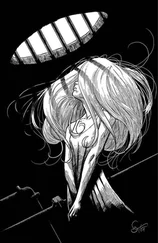I was pleased to find the skill of the talented musicians to be everything it was rumored to be. But my anxiety increased a proportionate amount. Excellence is excellence’s only companion. Had I not already decided to play “The Lay of Sir Savien Traliard” for purely spiteful reasons, these performances would have convinced me.
There followed another period of five or ten minutes. I realized that Stanchion was deliberately spacing things out to give the audience a chance to move about and make noise between the songs. The man knew his business. I wondered if he had ever been a trouper.
Then we had our first trial of the night. A bearded man of thirty years or so was brought onto the stage by Stanchion and introduced to the audience. He played flute. Played it well. He played two shorter songs that I knew and a third I didn’t. He played for perhaps twenty minutes in all, only making one small mistake that I could hear.
After the applause, the flutist remained on stage while Stanchion circulated in the crowd, gathering opinions. A serving boy brought the flutist a glass of water.
Eventually Stanchion came back onto the stage. The room was quiet as the owner drew close and solemnly shook the man’s hand. The musician’s expression fell, but he managed a sickly smile and a nod to the audience. Stanchion escorted him off the stage and bought something that came in a tall tankard.
The next to try her talent was a young woman, richly dressed with golden hair. After Stanchion introduced her, she sang an aria in a voice so clear and pure that I forgot my anxiety for a while and was ensnared by her song. For a few blessed moments I forgot myself and could do nothing but listen.
Too soon it was over, leaving me with a tender feeling in my chest and a vague prickling in my eyes. Simmon sniffled a little and rubbed selfconsciously at his face.
Then she sang a second song while accompanying herself on a half-harp. I watched her intently, and I will admit that it was not entirely for her musical ability. She had hair like ripe wheat. I could see the clear blue of her eyes from where I sat some thirty feet away. She had smooth arms and small delicate hands that were quick against the strings. And the way she held the harp between her legs made me think of . . . well, the things that every boy of fifteen thinks about incessantly.
Her voice was as lovely as before, enough to set a heart aching. Unfortunately, her playing could not match it. She struck wrong notes halfway through her second song, faltered, then recovered before she made it to the end of her performance.
There was a longer pause as Stanchion circulated this time. He milled through the three levels of the Eolian, talking with everyone, young and old, musician and not.
As I watched, Ambrose caught the eye of the woman on stage and gave her one of his smiles that seem so greasy to me and so charming to women. Then, looking away from her, his gaze wandered to my table and our eyes met. His smile faded, and for a long moment we simply watched each other, expressionless. Neither of us smiled mockingly, or mouthed small insulting nothings to the other. Nevertheless, all our smoldering enmity was renewed in those few minutes. I cannot say with certainty which of us looked away first.
After nearly fifteen minutes of gathering opinions, Stanchion mounted the stage again. He approached the golden-haired woman and took her hand as he had the previous musician’s. The woman’s face fell in much the same way his had. Stanchion led her from the stage and bought her what I guessed was the consolation tankard.
Closely on the heels of this failure was another talented musician who played fiddle, excellent as the two before him. Then an older man was brought onto stage by Stanchion as if he were trying for his talent. However the applause that greeted him seemed to imply that he was as popular as any of the talented musicians who had played before him.
I nudged Simmon. “Who’s this?” I asked, as the grey-bearded man tuned his lyre.
“Threpe,” Simmon whispered back at me. “ Count Threpe, actually. He plays here all the time, has for years. Great patron of the arts. He stopped trying for his pipes years ago. Now he just plays. Everyone loves him.”
Threpe began to play and I could see immediately why he had never earned his pipes. His voice cracked and wavered as he plucked his lyre. His rhythm varied erratically and it was hard to tell if he struck a wrong note. The song was obviously of his own devising, a rather candid revelation about the personal habits of a local nobleman. But in spite of its lack of classic artistic merit, I found myself laughing along with the rest of the crowd.
When he was done everyone applauded thunderously, some people pounding on the tables or stamping as well. Stanchion went directly onto the stage and shook the count’s hand, but Threpe didn’t seem disappointed in the least. Stanchion pounded him enthusiastically on the back as he led him down to the bar.
It was time. I stood and gathered up my lute.
Wilem clapped my arm and Simmon grinned at me, trying not to look almost sick with friendly worry. I nodded silently to each of them as I walked over to Stanchion’s vacant seat at the end of the bar where it curved toward the stage.
I fingered the silver talent in my pocket, thick and heavy. Some irrational part of me wanted to clutch it, hoard it for later. But I knew that in a few more days a single talent wouldn’t do me a bit of good. With a set of talent pipes I could support myself playing at local inns. If I was lucky enough to attract the attention of a patron, I could earn enough to square my debt to Devi and pay my tuition as well. It was a gamble I had to take.
Stanchion came ambling back to his spot at the bar.
“I’ll go next, sir. If it’s all right with you.” I hoped I didn’t look as nervous as I felt. My grip on the lute case was slippery from my sweating palms.
He smiled at me and nodded. “You’ve got a good eye for a crowd, boy. This one’s ripe for a sad song. Still planning on doing ‘Savien’?”
I nodded.
He sat down and took a drink. “Well then, let’s just give them a couple minutes to simmer and get their talking over with.”
I nodded and leaned against the bar. I took the time to fret uselessly about things I had no control over. One of the pegs on my lute was loose and I didn’t have the money to fix it. There had not been any talented women on stage yet. I felt a twinge of unease at the thought of this being the odd night where the only talented musicians at the Eolian were men, or women who didn’t know Aloine’s part.
It seemed only a short time before Stanchion stood and raised a questioning eyebrow at me. I nodded and picked up my lute case. It suddenly looked terribly shabby to me. Together we walked up the stairs.
As soon as my foot touched the stage the room hushed to a murmur. At the same time, my nervousness left me, burned away by the attention of the crowd. It has always been that way with me. Offstage I worry and sweat. Onstage I am calm as a windless winter night.
Stanchion bade everyone consider me as a candidate for my talent. His words had a soothing, ritual feel. When he gestured to me, there was no familiar applause, only an expectant silence. In a flash, I saw myself as the audience must see me. Not finely dressed as the others had been, in fact only one step from being ragged. Young, almost a child. I could feel their curiosity drawing them closer to me.
I let it build, taking my time as I unclasped my battered secondhand lute case and removed my battered secondhand lute. I felt their attention sharpen at the homely sight of it. I struck a few quiet chords, then touched the pegs, tuning it ever so slightly. I fingered a few more light chords, testing, listened, and nodded to myself.
Читать дальше











